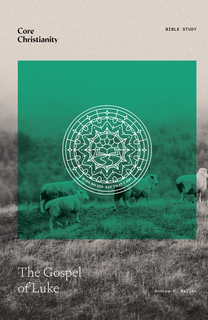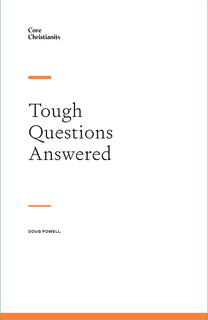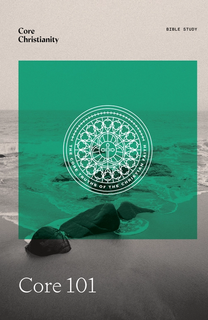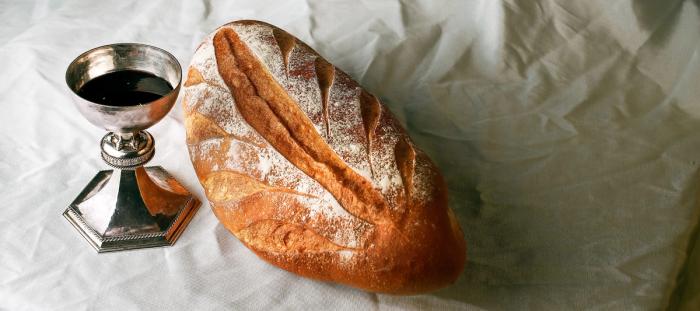What do you picture when you hear the word sacrament? It’s not an everyday word, so maybe you don’t picture anything, but if an image comes to mind, it’s likely a religious one. Maybe you imagine rituals performed by clergy in ornate clothing. Maybe you picture bread and wine.
The word sacrament comes from the Latin sacramentum, a term Romans used in the courtroom and military. It referred to an oath or pledge. Christians adopted the term to describe practices at the heart of the Christian life. But Christian sacraments aren’t primarily oaths that Christians make. First and foremost, sacraments are about God’s covenant promises to us, his people.
But what are these practices? How many sacraments does the church have? How are the sacraments related to God’s promises?
According to the Bible, there are two sacraments: baptism and the Lord’s Supper (also known as communion). God the Holy Spirit works through these practices to identify and strengthen Christ’s church. The sacraments are pictures of the gospel—through the sacraments, the church receives Christ and his grace.
How Does God Give Us Grace?
Christ builds his church in two main ways: word and sacrament. These are often called the ordinary means of grace. In other words, they’re the normal ways that Christ and his work become real in our lives. Through the word and the sacraments, all the blessings of the gospel become ours.
Through his word, the Bible, God announces his law and his gospel. The law is God’s perfect moral standard. It teaches us the life of love God meant us to live. But we’re sinners who break that law every day. For us, then, the law is a mirror. It shows us how far short of God’s standards we fall. The law tells us that we deserve to die for our sins (Gen. 2:16–17; Rom. 6:23).
But through his word, God also announces the gospel. He tells sinners like us good news: the Son of God became a man to live and die in our place. If we trust in Christ, then God credits Christ’s perfect life to us. And he forgives us because Christ died on the cross to satisfy God’s justice. Christ paid the price for our sins.
The sacraments, baptism and the Lord’s Supper, announce the same gospel. Through the word, we hear the good news; through the sacraments, we see it.
When Jesus Christ gave his disciples the Great Commission to bring the good news to the world, he told them to preach the word. But he also told them to perform a sacrament. He told them to baptize: “All authority in heaven and on earth has been given to me. Go therefore and make disciples of all nations, baptizing them in the name of the Father and of the Son and of the Holy Spirit, teaching them to observe all that I have commanded you” (Matt. 28:19–20).
The church’s job is to bring both the word and the sacraments to the world.
But What Exactly Are the Sacraments?
A sacrament is a means of grace instituted by Jesus Christ, which he told his church to practice. Jesus instituted baptism when he gave his disciples the Great Commission (Matt. 28:19–20). He instituted the Lord’s Supper the night before he died (Luke 22:19).
Sacraments are both signs and seals. As signs, they show us pictures of God’s invisible grace, or favor. Baptism signifies death and resurrection and, therefore, the new life we have in Christ (Rom. 6:3–4). The water also shows that, through Christ, we’re cleansed of our sins (1 Pet. 3:21).
Baptism identifies someone as a Christian. It’s performed when he or she first becomes part of the church. When an adult is baptized, he or she confesses her faith in Christ before the church. When a baby is baptized, the parents of the child promise to raise the child in the church and teach their child about God’s covenant promises. Baptism should normally happen only once in a person’s life.
Jesus told his disciples that the Lord’s Supper, or communion, points to the same gospel that baptism does:
Now as they were eating, Jesus took bread, and after blessing it broke it and gave it to the disciples, and said, ‘Take, eat; this is my body.’ And he took a cup, and when he had given thanks he gave it to them, saying, ‘Drink of it, all of you, for this is my blood of the covenant, which is poured out for many for the forgiveness of sins. —Matt. 26:26–28
The bread and the wine signifies Christ’s body and blood. Like the bread, his body would be broken on the cross. Like the wine, his blood would be “poured out,” and this would be for “the forgiveness of sins.” The bread and wine in communion don’t become the body and blood of Jesus. Instead, they’re signs that display Jesus’ sacrificial death before our eyes. Unlike baptism, which we receive once, Christians eat the bread and drink the wine of communion throughout our lives.
Neither baptism nor the Lord’s Supper saves us. Rather, it is the thing that both point to—Jesus Christ and him crucified—which saves us.
But the sacraments aren’t just signs. They don’t just point to spiritual realities. They’re seals of God’s covenant promises (Rom. 4:11). When a king places his seal on a document, those who see the seal know that the words on the page are official. They bear the authority of the king himself. Likewise, God seals his people with his sacraments. His seal shows us that we belong to him. And this strengthens our faith in his promises.
Sacraments don’t have power on their own. Instead, the Holy Spirit acts through sacraments. He brings God’s grace to those who receive the sacraments by faith. Through the sacraments, we receive Christ, and we’re sealed as his own.
How Should Christians Worship?
Both baptism and the Lord’s Supper normally occur during the church’s Sunday worship. When we receive baptism or the Lord’s Supper, we confess our faith in Christ and our desire to live for his glory. They’re an essential part of Christian worship.
But Christian worship doesn’t begin with us. Instead, God calls us into his presence, which is only possible because of the gospel (Heb. 10:19–22). God speaks to us through his word, and we respond to him with thanksgiving and praise.
Likewise, the sacraments show us God’s grace. They’re pictures of the gospel, God’s offer of grace through the death and resurrection of Christ. As we receive them by faith, we confirm our trust in his promises and then respond to him with prayer and praise.
Baptism and the Lord’s Supper aren’t primarily our pledge to be faithful; they’re first of all God’s pledge to be faithful. And God can’t break his promises.
What Does the Bible Say?
- Matt. 26:26–28; 28:19–20; Luke 22:19; John 1:26–28, 33; Rom. 4:9–12; 6:3–11; 1 Cor. 10:16–21; 11:17–34
Recommended Resources
- Core Christianity, by Michael Horton
- Baptism: Three Views, edited by David F. Wright










